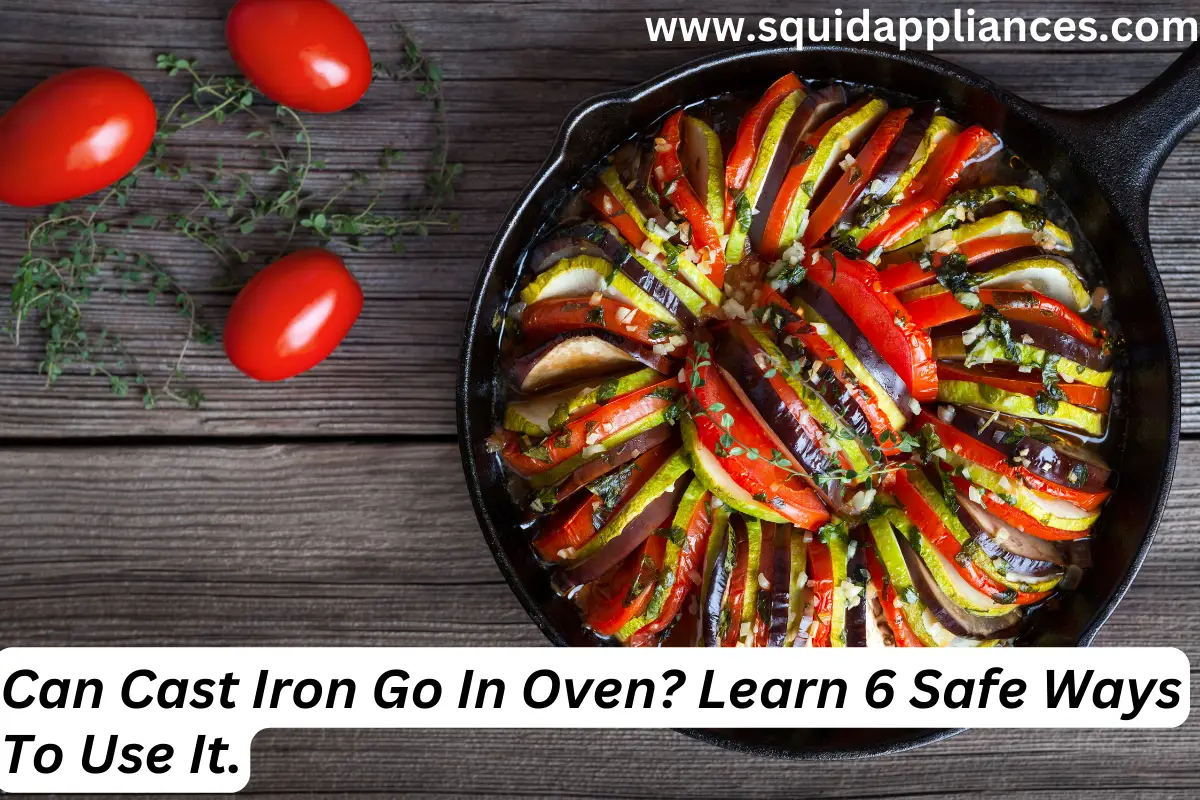So you’ve got yourself a trusty cast iron skillet and you’re wondering, can cast iron go in the oven? Well, I’m here to tell you that not only can it go in the oven, but there are actually six safe ways to use it.
Cast iron is known for its versatility and durability, making it a staple in many kitchens. Whether you’re baking bread, roasting vegetables, or searing a steak, your cast iron skillet can handle the heat.
In this article, we’ll dive into the proper techniques for preheating your cast iron, seasoning it to perfection, and handling it safely with oven mitts. We’ll also discuss how to avoid sudden temperature changes that could damage your skillet and provide tips for cleaning and storing it properly.
So let’s get started on learning these six safe ways to use your cast iron in the oven!
Can Cast Iron Go In Oven?
Yes, cast iron can go in the oven and has six safe ways to use it. Preheating ensures even heat distribution, seasoning with flaxseed oil prevents rust, and handling it with mitts is crucial. Avoiding sudden temp changes, proper cleaning, and oven mitts enhance safety and durability for versatile cooking experiences.
Key Takeaways
- Cast iron is versatile and durable, making it a great choice for oven use.
- Preheating cast iron allows for even heat distribution and creates a non-stick surface.
- Properly seasoning cast iron involves cleaning, drying, and applying a thin layer of flaxseed oil.
- Using oven mitts or silicone gloves is crucial when handling hot cast iron to prevent burns and accidents.
Preheating Your Cast Iron
You’ll want to start by preheating your cast iron. This allows the heat to slowly penetrate the sturdy metal until it becomes a glowing red-hot pan ready for cooking. Preheating techniques are essential for achieving even heat distribution throughout your cast iron and ensuring that your food cooks evenly.
By preheating, you also minimize the chances of sticking and create a non-stick surface. Overall, preheating your cast iron has numerous benefits that enhance your cooking experience.
Properly Seasoning Your Cast Iron
To properly season your cast iron, it’s essential to follow these simple steps. First, clean the cookware thoroughly by scrubbing it with hot water and a stiff brush. Next, dry it completely to prevent rust.
Then, apply a thin layer of flaxseed oil using a paper towel or cloth. Place the cast iron upside down in a preheated oven at 400°F for one hour.
Finally, allow it to cool before wiping off any excess oil. Avoid common mistakes like using too much oil or not preheating the oven properly for optimal seasoning results.
| Benefits of Using Flaxseed Oil | Common Mistakes to Avoid |
|---|---|
| Creates a nonstick surface | Using too much oil |
| Improves heat distribution | Not preheating the oven properly |
| Prevents rust | Applying multiple layers of oil |
Using Oven Mitts for Handling Hot Cast Iron
When handling hot cast iron, it’s crucial to protect your hands by using oven mitts. One option is using silicone gloves specifically designed for handling hot cast iron. These gloves provide excellent heat resistance and allow for a secure grip on the cookware.
Another benefit of using oven mitts made of heat resistant materials is that they offer added protection against burns and accidents while handling hot cast iron in the oven or on the stovetop.
Avoiding Sudden Temperature Changes
Avoiding sudden temperature changes is essential to prevent damage and maintain the longevity of your cookware, ensuring a smooth and enjoyable cooking experience. When using cast iron in the oven, it’s important to avoid thermal shock, which can lead to cracks in the material.
To prevent this, always preheat your oven before placing the cast iron inside and allow it to cool gradually after use. By taking these precautions, you can protect your cast iron and enjoy its benefits for years to come.
Cleaning and Storing Your Cast Iron Safely
Properly maintaining your cast iron cookware is crucial for preserving its quality and ensuring it lasts for generations to come. When it comes to storing cast iron, make sure it’s completely dry before putting it away to prevent rusting.
Additionally, avoid stacking multiple pieces together as this can lead to scratches and damage. For cleaning techniques, avoid using soap and instead, opt for hot water and a gentle scrubbing brush. Remember to thoroughly dry the cookware after cleaning to prevent moisture buildup.
Frequently Asked Questions
Can I use cast iron on an electric stove?
Yes, cast iron can be used on an electric stove safely. It is important to follow proper precautions and ensure the cookware is properly seasoned. If you prefer alternative stove options, there are induction cooktops available as well.
How long should I preheat my cast iron in the oven before cooking?
I preheat my cast iron in the oven for about 15 minutes before cooking. This allows it to evenly distribute heat and ensures a crispy crust. Preheating also helps to prevent sticking and promotes better browning of food.
Can I use soap to clean my cast iron?
Using soap on cast iron is generally not recommended as it can strip away the seasoning. Instead, clean with hot water and a brush. To properly season cast iron, apply a thin layer of oil and bake in the oven at 350°F for an hour.
Is it safe to use cast iron on a glass-top stove?
Using cast iron on a glass-top stove has benefits like even heat distribution and compatibility with all cooktops. Alternatives include stainless steel or copper pans. However, be cautious of scratching the glass surface.
Can I use my cast iron skillet on a barbecue grill?
Yes, you can use a cast iron grill pan on a barbecue grill. It provides an alternative cooking method for your cast iron skillet, allowing you to enjoy delicious grilled dishes with the same heat retention and even cooking that cast iron offers.
Conclusion
In conclusion, using cast iron in the oven can be a safe and effective way to cook. By following the proper steps, such as preheating, seasoning, and handling with oven mitts, you can ensure that your cast iron will perform at its best.
It’s important to avoid sudden temperature changes and clean and store your cast iron properly to maintain its longevity. With these precautions in mind, you can confidently use your cast iron cookware for delicious meals time and time again.






